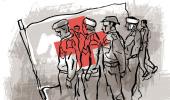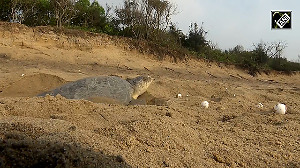'On October 12-13, he started shivering from fear in his tent.'
'That was the time he wrote a letter to my mother to conduct Ganeshji's Atharvashirsha.'
'The moment he finished writing that letter, he told us, he felt serene calmness.'

As my colleague Anant Salvi finished translating several passages of Lieutenant Colonel Shrikant Hasabnis's account of being a Chinese prisoner of war and what he and his troops went through defending the Galwan post in the 1962 war with China, he was wiping his tears.
Anant was reading the book written in Marathi and translating the sentences in Hindi verbally. As I made notes, I did not notice his tears.
"It is men like him that we must honour. These are men who are worthy of statues, roads and airports being named after them," Anant said, holding Colonel Hasabnis's autobiography as he stood up and wiped his moist eyes with his handkerchief.
Lieutenant Colonel Hasabnis was an extraordinary soldier. As a young major, he commanded a company of 70 soldiers of 5 Jat that were inducted into Galwan in October 1962.
The Jats were soldiers from the plains who had never experienced sub-zero temperatures at such punishing heights.
They were woefully underequipped in terms of weapons, clothing, dwelling and rations -- 20 of the 70 men did not even have a weapon. They were surrounded by hundreds of belligerent Chinese troops on all sides who would display their modern weapons on the frontlines.
5 Jat was armed with basic outdated weapons.
There were no barbed wire obstacles to defend themselves from the enemy.
The ammunition provided to them would last just 15 minutes.
The Chinese had foreign made thermal gear while Indian troops had basic clothing -- their overcoat itself weighed 5 kgs. Their fingers would get stuck to the guns due to the freezing temperatures. The skin would peel off; blood would flow out of the nose and ears; breathing was difficult in the rarefied air -- it was as if a man was sitting on the chest.
The vegetarian soldiers and Major Hasabnis were compelled to eat non vegetarian tinned food that was air-dropped because that was all there was to survive.
The Chinese harassed and harangued them throughout. The men knew they had been ordered into the valley of death, yet, not one Indian soldier said he wanted to go back.
They were wanting in everything a soldier needed to fight, but what they did not lack was courage.
They all stood firm against impossible odds as Major Hasabnis constantly counselled and encouraged his troops in order to boost their morale.
Two weeks after they were inducted, the Galwan post was attacked and destroyed by the Chinese.
30 soldiers from the company laid down their lives. Twelve were injured.
Major Hasabnis was captured as a prisoner of war along with 11 soldiers. They were kept in solitary confinement.
After seven months of captivity, Major Hasabnis was released and repatriated to India.
His wife who had bravely confronted that difficult period without shedding a tear, broke down on meeting her husband on his return.
His sons who were just two and three-and-half at that time went on to join the Indian Army after him.
Colonel Hasabnis fought in the 1971 War and took early retirement in 1977. He passed away in 2022.
His son Lieutenant General Sudharshan Hasabnis, who retired as the deputy chief of army staff, spoke to Archana Masih/Rediff.com about his father, the extraordinary soldier.
Part I of the interview:
What are the family memories of your father being a Chinese prisoner of war in the 1962 War? How did this news reach your mother and how did she take it?
On October 21, 1962 an aircraft flew over Galwan and reported that there was nothing to show that a post once existed there -- my father's post had been totally devastated.
The news that the post had been completely run over was reported to the Jat Regimental Centre [in Bareilly] where my maternal uncle was posted. He conveyed the news to his brother in Pune and that was the first input that reached my family.
I was two years old at that time; my elder brother was three-and-a-half. We were in Pune with our grandparents. My mother was not informed, but my paternal uncles were told that the post where my father was had been devastated.
Subsequently, Army Head Quarters issued a telegram which read: 'Missing, presumed killed'.
My mother refused to accept the news.
Our joint family provided immense support to my mother.

Those times must have been very difficult for the family. When was it known that your father was alive?
The atmosphere was very tense at home.
My mother refused to accept that he was no more.
In difficult times people tend to turn to conventional and unconventional methods to find out what could have happened, including fortune tellers who gave indications that he was alive.
But the first authentic news about him being taken prisoner came around three months later through the Red Cross.
The Red Cross was allowed access to the prisoners and subsequently the family was informed.
He was alive, but was a captive of the Chinese. Therefore, it was still a very grim situation.
My mother was very tense, but I was told she never shed a tear.
Her belief that he is alive and will return was so deep that she never cried. She cried only on his return.
He came back after 7 months.
Yes, on May 10, 1963. He was first sent in a plane to Ranchi on May 7 where he was debriefed.
Later in life did he share the memories of those days with your brother and you?
It did not come out voluntarily, but as we grew we heard from him. When both of us brothers joined the army, we used to talk to him about those days and would tell him to write about it.
He started writing snippets and sometimes would talk to my mother and she would write. We published a collection of their memories as a Marathi book in 2022.
In the last month of captivity, they were taken to then Peking [Beijing] to show how the Communist system was better than the 'bourgeoisie, capitalist Indian Nehru government' -- that is how the Chinese would word it.
In fact, while they were in Galwan, the Chinese soldiers used to tell them that they had nothing against the Indian troops, but against the Indian government. They used to tell them, 'You leave, we will make way for you to go back. This is not your territory, you are in the wrong place, this is ours', and yet say 'Hindi-Chini Bhai Bhai'.
They also did this with the Gorkhas who had gone ahead and established that post. They were there from June to October.
My father's company was inducted in October. The Indian soldiers withstood continuous harassment from Chinese troops.
Even at that time they had Hindi speakers among their troops while we had no such capability. They could speak in Hindi and English with our troops.

What did the Jats encounter when they reached the post? They were the first troops from the plains to be inducted at such heights and difficult conditions?
The company was taken in by helicopters as the post was surrounded by the Chinese. When the company was inducted, the men knew it was a suicide mission.
The Chinese would put their best weapons on display while the 60 men that my father had, including himself, nearly 20 didn't have weapons -- that was the state of our military. Their clothing provided minimal protection.
The Jats knew that it was the end for them, but not one soldier told my father that he wanted to go back and that tells you about the strength of our military.
And 30 of them laid down their lives?
Yes.

How did this experience change your father?
His basic character did not change.
Our household had a spiritual grounding. In fact, when the Chinese had started firing, he had worn his trousers over his pajamas and rushed out.
In captivity, he would tear that pajama and make knickers because they were not allowed to have a bath for six months.
The first six months were very bad. He made a jap mala from the nada [string] of the pajama and prayed. The spiritual grounding helped.
On October 12-13, he started shivering from fear in his tent because of lack of orientation. He could not think and that was the time he wrote a letter to my mother to conduct Ganeshji's Atharvashirsha which was a regular feature in our home.
The moment he finished writing that letter, he told us, he felt serene calmness. After that, he was in control of himself.
Just two days later, his senior JCO Subedar Nihal Singh who was awarded a Vir Chakra for his action came to him in a similar state.
It was the fear of the unknown. The soldiers could not fathom what would happen to them even though death was staring them in the face. Subedar Nihal Singh narrated his experience and my father calmed him.
Subedar Singh later laid down his life defending his post.

The spiritual character held him together at that difficult time?
I would like to believe so.
In captivity the Chinese who are Communists and don't believe in religion used to tell him that there was no God.
Major Dhan Singh Thapa, Param Vir Chakra, was with my father for a while in a tent during captivity. Major Thapa would get very agitated and my father would calm him down saying we would give them a suitable reply.
My father told the Chinese that he would prove to them that God exists and told them what Swami Vivekananda had written. How explained the definition of a point -- a point has no length, breadth, shape or depth, but it exists and that is how we define our God.
The Chinese got upset, but thereafter, did not really get after him. The spiritual strength that he had built really helped him.
- Part 2 of the Interview: 'India Has Become More Aggressive With China'
Feature Presentation: Aslam Hunani/Rediff.com











 © 2025
© 2025